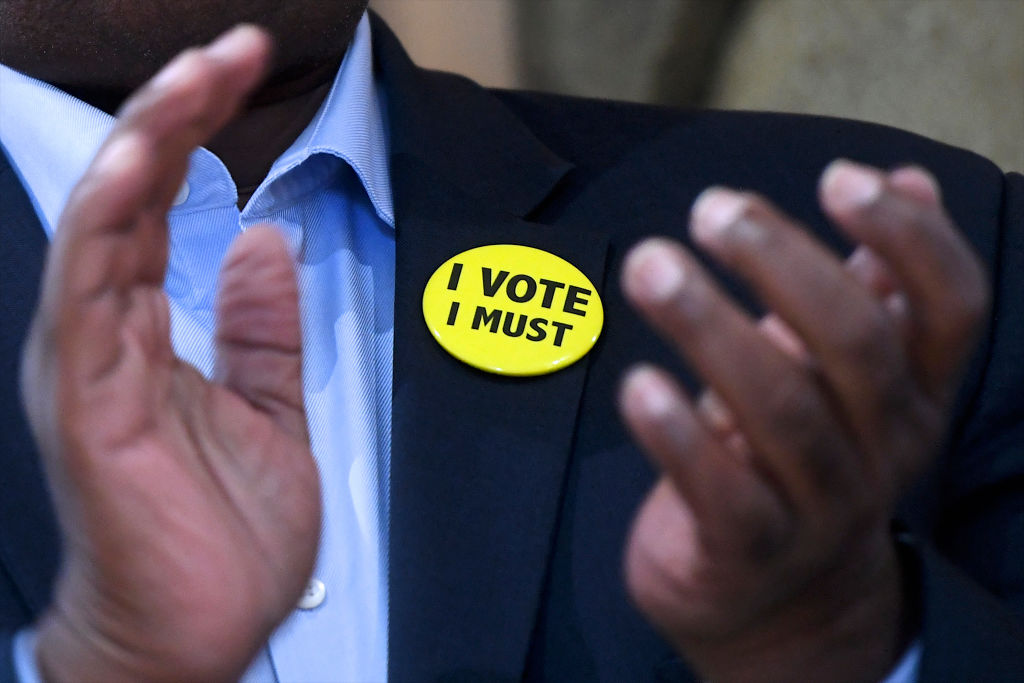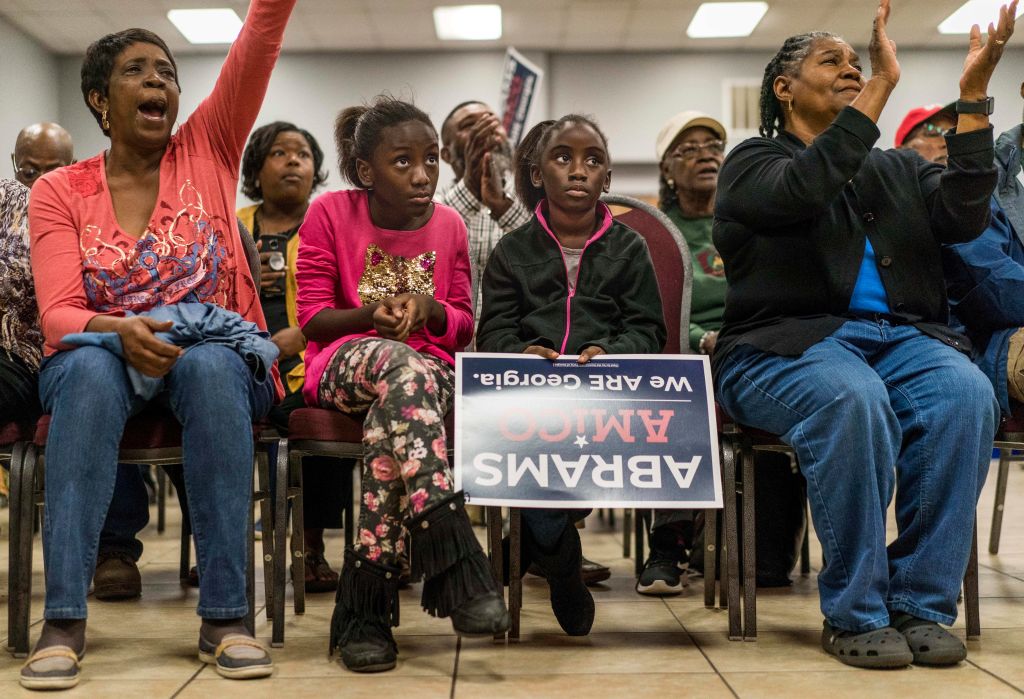
Source: Mark Makela / Getty
One of the nation’s leading election-minded groups working to build and fortify Black political power has announced it will award more than $1 million to 10 Black-led organizations to mobilize Black male voters ahead of the 2024 election.
The announcement from the Black Futures Lab comes as a series of national polls suggest that more Black people – particularly Black men – are supporting Donald Trump, the presumptive Republican presidential nominee.
Through its Black Organizing Innovations Project, the Black Futures Lab awarded a total of $1.4 million to groups that include organizations like Black Voters Matter, the Working Families Party and Black Men Build.
Alicia Garza, Black Futures Lab’s founder and principal, said in a statement that the funds are to be used to help foster the Black male voters – “a critical part of the Black vote” – who are already actively working to protect democracy.
“Black men are organizing, supporting each other and the rest of us to show up, be engaged, and participate. We know that our communities show up when we invest deeply and consistently,” Garza said in a press release emailed to NewsOne. “That’s why we are proud to be funding organizations across the country that are doing the work to meet Black men where they are and listen to them about what they want for their futures. In doing so, we are doing our part to finally bring forward a democracy that we all can be proud of.”
The hope is that the funding will mobilize at least 30,000 Black male voters around the country, including those who are fathers and were formerly incarcerated.
The press release listed the 10 organizations receiving the funding and their plans for how to use them:
- Black Men Build will activate 5,000 Black men through the New Men Tour, using cultural and power-building strategies to engage and activate Black men across nine states.
- Black Voters Matter Capacity Building Institute’s “Bruhs to the Ballot” program will increase Black male civic engagement in Georgia by removing barriers to participation, such as conducting warrants clinics.
- California Black Power Network will activate a minimum of 2,500 Black men across California through digital and offline integrated voter engagement, statewide listening sessions, and men’s circles.
- Detroit Action Education Fund will use online and offline organizing to engage Black men in Michigan.
- Equity and Transformation will reach 5,000 systems-impacted Black men in Illinois through the “Big Payback” campaign, a policy initiative in Chicago advocating for reparations for the Drug War.
- Hudson Catskills Housing Coalition will activate 2,500 formerly incarcerated Black men in New York who are now eligible to vote through the new Clean Slate New York law.
- Liberty and Legacy Era/DopeEra will increase Black male civic participation in California through “Thug Therapy.”
- Power Coalition for Equity and Justice will activate 10,000 Black men in Louisiana through a statewide campaign that develops Black men’s capacity as organizers, and engages fathers and churches.
- Women Engaged will use online and offline organizing to activate a minimum of 2,500 Black men in Georgia around reproductive justice.
- Working Families Party will activate 2,500 Black men in Wisconsin through virtual and in-person experimentation with artificial intelligence.
The announcement of the funding coincides with a wave of court rulings affecting Black voting power along with polling that indicates more African American voters are moving closer to supporting Trump’s presidential candidacy.
Aside from ongoing gerrymandering battles in several key states, a recent appeal court decision to undermine the Voting Rights Act of 1965 and New Hampshire’s decision to snub South Carolina for the nation’s first primary that was criticized as “a slap in the face to Black voters,” credible reports of voter intimidation and voter suppression out of Mississippi during elections there last month suggest such nefarious political tactics could be employed on a wider scale for the national elections next year.
Those threats to Black voting power are exacerbated by recent polling that found Trump is enjoying a level of support from Black voters in crucial battleground states previously “unseen” by a Republican candidate seeking the White House.
Reuters reported in August that “some” Black men are losing faith in President Joe Biden.
A pollster who worked on Biden’s winning 2020 campaign recently suggested that young Black male voters, in particular, have been neglected by Democrats since Trump lost the White House.
“I don’t think we’ve been voicing what we delivered to the African American community and particularly among younger African American men,” Celinda Lake told the New York Times in an article published last month. “We have to get the numbers up and we have to get African American voters out to vote, and we have to get the numbers up with young people and we have to get them out to vote.”
Black Futures Lab, whose Black Census Project is responsible for the “largest survey of Black people in the United States since Reconstruction,” is clearly aware and already on the case.
SEE ALSO:
Ohio’s Black Voters Credited For Protecting Abortion Access, Legalizing Recreational Marijuana
Black Voters Scapegoated For Louisiana Electing Suspected White Supremacist Jeff Landry As Governor
The post Funds Pledged To Mobilize Black Male Voters As Polls Claim More African Americans Supporting Trump appeared first on NewsOne.

